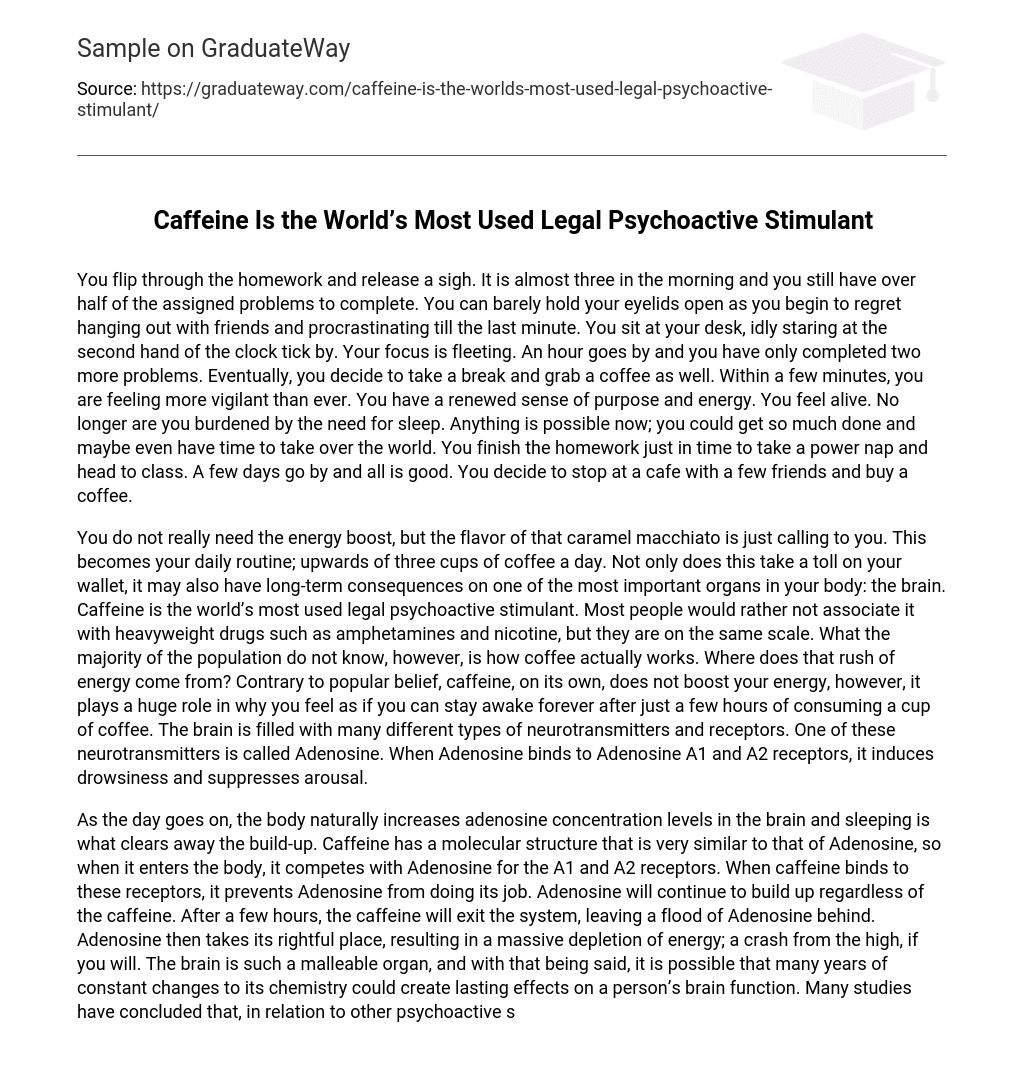You flip through the homework and release a sigh. It is almost three in the morning and you still have over half of the assigned problems to complete. You can barely hold your eyelids open as you begin to regret hanging out with friends and procrastinating till the last minute. You sit at your desk, idly staring at the second hand of the clock tick by. Your focus is fleeting. An hour goes by and you have only completed two more problems. Eventually, you decide to take a break and grab a coffee as well. Within a few minutes, you are feeling more vigilant than ever. You have a renewed sense of purpose and energy. You feel alive. No longer are you burdened by the need for sleep. Anything is possible now; you could get so much done and maybe even have time to take over the world. You finish the homework just in time to take a power nap and head to class. A few days go by and all is good. You decide to stop at a cafe with a few friends and buy a coffee.
You do not really need the energy boost, but the flavor of that caramel macchiato is just calling to you. This becomes your daily routine; upwards of three cups of coffee a day. Not only does this take a toll on your wallet, it may also have long-term consequences on one of the most important organs in your body: the brain. Caffeine is the world’s most used legal psychoactive stimulant. Most people would rather not associate it with heavyweight drugs such as amphetamines and nicotine, but they are on the same scale. What the majority of the population do not know, however, is how coffee actually works. Where does that rush of energy come from? Contrary to popular belief, caffeine, on its own, does not boost your energy, however, it plays a huge role in why you feel as if you can stay awake forever after just a few hours of consuming a cup of coffee. The brain is filled with many different types of neurotransmitters and receptors. One of these neurotransmitters is called Adenosine. When Adenosine binds to Adenosine A1 and A2 receptors, it induces drowsiness and suppresses arousal.
As the day goes on, the body naturally increases adenosine concentration levels in the brain and sleeping is what clears away the build-up. Caffeine has a molecular structure that is very similar to that of Adenosine, so when it enters the body, it competes with Adenosine for the A1 and A2 receptors. When caffeine binds to these receptors, it prevents Adenosine from doing its job. Adenosine will continue to build up regardless of the caffeine. After a few hours, the caffeine will exit the system, leaving a flood of Adenosine behind. Adenosine then takes its rightful place, resulting in a massive depletion of energy; a crash from the high, if you will. The brain is such a malleable organ, and with that being said, it is possible that many years of constant changes to its chemistry could create lasting effects on a person’s brain function. Many studies have concluded that, in relation to other psychoactive stimulants, caffeine has little to no immediate damaging effects on a person’s health. However, not much is known about the long-term effects of chronic caffeine consumption.
Because of this, scientists like Xuesong Chen, George Sutphin, Tom McLellan, and many others have performed various experiments to find answers. Several of these scientists have studied how caffeine affects the brains of certain animals. A 2008 study done by Dr. Chen et al. shows a connection between caffeine and Alzheimer’s disease in rabbits. Some of the rabbits were fed a high-cholesterol diet, which has been known to cause a multitude of health issues in humans, alongside a few milligrams of caffeine. Compared to their non-caffeinated counterparts, their blood brain barrier (BBB) was undamaged. As a result, it can be assumed that caffeine protected the blood brain barrier of these rabbits from excess cholesterol, preventing blockages and build-up within the arteries. Another study done in Brazil also showed results in favor of coffee consumption. Renata Abreu and her team conducted a study on rats to see how caffeine affects their brain function. The data from the experiment showed improvement in the long-term memory of the rats that were given caffeine.
A more recent study published in 2012 by George Sutphin et al. adds another remarkable discovery to the list. According to the research he and his team have conducted, caffeine, under certain temperatures, increased the lifespan of Caenorhabditis elegans (C. elegans) compared to the roundworms that received no caffeine. These studies are not exclusive to laboratory animal. Promising results in other animals could mean promising results in humans as well and many scientists have done research that give similar results. Studies like the ones done by Rob van Dam and Parvin Mirmiran have shown a link between coffee consumption and Type 2 Diabetes. The results of their research show that consistent coffee consumption can lead to a “…substantially lower risk of type 2 diabetes.” (van Dam, Rob).
According to the work done by these researchers and many others, it has been discovered that frequent coffee intake has long-term benefits. It can possibly protect the brain from neurodegenerative disorders like Alzheimer’s and dementia by reducing the chances of strokes and protecting the blood brain barrier. Though the collective data on frequent caffeine intake seems promising, increasing the amount of coffee you drink on a daily basis is not necessary. However, if you are consuming more than a few cups a day, cutting back might be more beneficial for your health in the long run. Keep in mind that similar to overuse of any stimulant, withdrawal symptoms are very likely.





